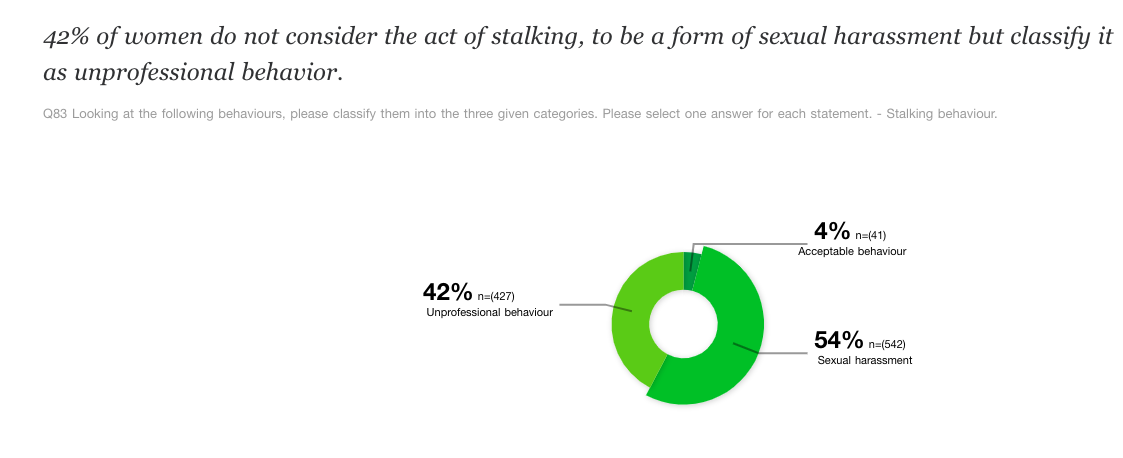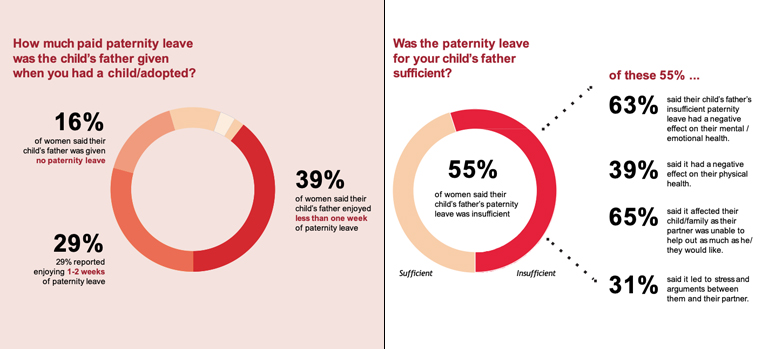Survey: 46% Of M'sian Women In The Workplace Do Not Consider Stalking As Sexual Harassment
The disturbing findings were revealed in a new study.
On Tuesday, 27 October, two local organisations dropped some disturbing insights from a new study they conducted recently
The study, conducted by Women's Aid Organisation (WAO) in collaboration with a local research agency called Vase, was administered from 26 to 28 September this year.
The aim of the study was to understand Malaysian women's current reality in the workforce, their challenges and awareness on harassment, and discrimination in the workplace.
According to Vase, a total of 1,010 responses were included in the final sampling, which allowed respondents, aged 24 to 55, to answer the survey questions in English and Bahasa Melayu.
However, individuals aged 45 to 55 were underrepresented, likely due to lower rates of women active in the workforce since the last five years, which was one of the criteria of participation for the respondents.
According to WAO and Vase, the purpose of the study is to be a reflection of the current environment working women and working mothers face within the workplace and the challenges they faced during the first movement control order (MCO) period that lasted for 83 days amidst the ongoing COVID-19 pandemic.
The study found that while 71% of women think that workplace sexual harassment is an issue, 42% of women do not consider stalking a form of sexual harassment. They classify it as unprofessional behaviour.
Stalking, while prevalent, is not a crime in Malaysia because there are currently no laws against it.
According to a 2013 report by WAO, an estimated 250,000 Malaysian women have been victims of stalking by their abusers who range from domestic partners, workplace colleagues, and strangers.
In October this year, the issue of online stalking was highlighted again when a few netizens brought attention to a Telegram group with 35,000 members for spreading women's photos without their consent.
The government is expected to table the Sexual Harassment Bill in Parliament in November this year. WAO has advocated for making stalking an offence in the Penal Code.
"The anti-stalking laws would protect against both offline and online stalking and harassment, including various forms of gender-based cyber violence – like harassment, spying, and doxxing – and would also make available protection orders for survivors," WAO said in its recommendations earlier this month.
Meanwhile, in the study, while the majority of women classified stalking as sexual harassment, a small number of women, 41 out of 1,010, also said that stalking is 'acceptable behaviour'.
Apart from stalking, there are also other forms of sexual harassment such as unwelcome touching and repeated advances that some of the women surveyed classified as 'unprofessional behaviour'
Unwelcome touching or grabbing is not considered a form of sexual harassment by 15% of women, while 33% of women said a person making sexual jokes or innuendos is also not sexual harassment.
Additionally, while 39% of women say they have experienced offensive sexual jokes or innuendos in the workplace during the course of their employment, they would classify it as unprofessional behaviour.
Majority of women, however, did classify this as sexual harassment.
The respondents were also divided about the aspects of what they consider an act of someone repeatedly making advances towards a person who has already declined them.
Among them, 5% said it was acceptable behaviour, 45% said it was sexual harassment, and 50% of them said they would classify it only as unprofessional behaviour.
A majority of women who were surveyed also do not consider the act of suggesting a co-worker to make advances towards a client or potential client to be a form of sexual harassment.
Meanwhile, there's a difference in friendly banter and straight-up harassment.
Recently, Malaysia's Industrial Court ruled that non-physical actions can be construed as sexual harassment, especially if it's unwanted. In its judgement, the court said that calling your colleague 'sayang' in the workplace counts as sexual harassment.
A majority of Malaysian women have also experienced at least one form of gender discrimination in the workplace, according to the study
WAO said that this includes women "receiving comments or questions about their marital status or plans to start a family, being passed over for promotion in favour of less qualified colleagues, and being asked to do tasks that are not asked of male colleagues, such as making coffee and preparing refreshments".
Additionally, 47% of women were asked about their marital status during a job interview, while one in every five women were questioned on their ability to perform certain tasks as a woman.
For example, 27% of women who currently have children say they received comments or questions about their ability to perform certain tasks while they were pregnant.
Working mothers do not feel they were given adequate paid maternity leave.
65% of women who were affected by insufficiency of paternity leave for the father of their child say it affected their child/family as their partner was unable to help out as much as he/they would like, while 31% say it led to stress and arguments between them and their partner.
Based on the study's findings, WAO said it would like to reiterate its call for five key amendments to the Employment Act 1955
The five key amendments are:
- Introduce at least seven days of paid paternity leave in the private sector
- Extend paid maternity leave in the private sector from 60 to 90 days
- Introduce prohibitions against discrimination based on gender, race, religion, and disability status for employees and job seekers
- Introduce the right to request for flexible working hours and be protected from discrimination as a result of doing so
- Strengthen protections against sexual harassment in the Employment Act 1955, in addition to passing an independent Sexual Harassment Act
WAO has asked for these amendments to be made in the November Parliament session.


